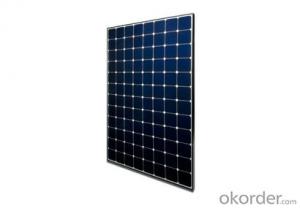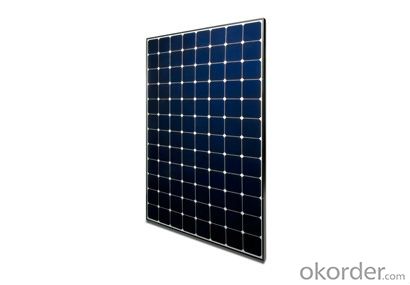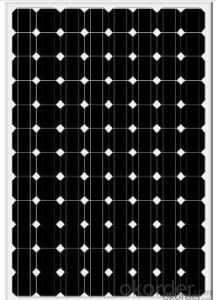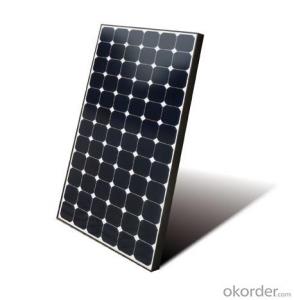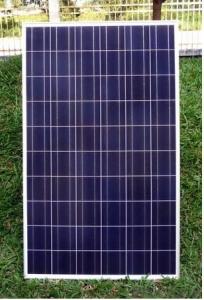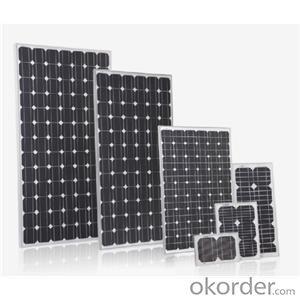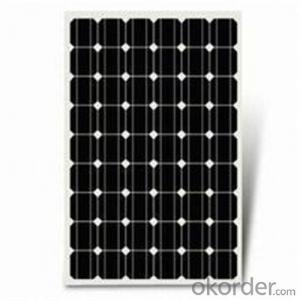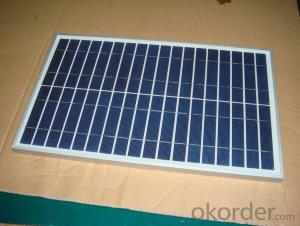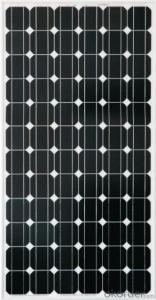Aurora Solar Panels - Monocrystalline Solar Module 200W with Outstanding Quality and Price
- Loading Port:
- China main port
- Payment Terms:
- TT OR LC
- Min Order Qty:
- 100 watt
- Supply Capability:
- 10000 watt/month
OKorder Service Pledge
OKorder Financial Service
You Might Also Like
Specification
Monocrystalline Solar Module 200W with Outstanding Quality and Price
Production Description
solar cell (or a "photovoltaic" cell) is a device that converts photons from the sun (solar light) into electricity.
In general, a solar cell that includes both solar and nonsolar sources of light (such as photons from incandescent bulbs) is termed a photovoltaic cell.
Fundamentally, the device needs to fulfill only two functions: photogeneration of charge carriers (electrons and holes) in a light-absorbing material, and separation of the charge carriers to a conductive contact that will transmit the electricity.
This conversion is called the photovoltaic effect, and the field of research related to solar cells is known as photovoltaics.
Solar cells have many applications.
Historically solar cells have been used in situations where electrical power from the grid is unavailable, such as in remote area power systems, Earth orbiting satellites, consumer systems, e.g. handheld calculators or wrist watches, remote radio-telephones and water pumping applications.
Solar cells are regarded as one of the key technologies towards a sustainable energy supply.
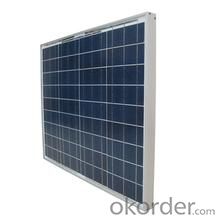
Application
remote area home system
earth orbiting satellites
consumer system
water pumping system
residential
commercial
industrial
rooftop
Product Feature
Higer convension than the poly solar module
12 years product warranty
A grade solar panel with good surface looking
EVA tempered glass TPT
MC4 connecter
Package
24pcs into one carton 312pcs into a 20 foot container.
- Q: Can solar panels be used for air conditioning?
- Yes, solar panels can be used to power air conditioning systems. Solar panels generate electricity from sunlight, which can be used to operate air conditioning units. This allows for cooling without relying on traditional electricity sources, reducing energy costs and environmental impact.
- Q: Can solar panels be installed on historic homes or buildings?
- Yes, solar panels can be installed on historic homes or buildings. However, it is important to consider the specific regulations and guidelines in place for historic preservation in each jurisdiction. In some cases, there may be restrictions on the placement and design of solar panels to ensure they do not detract from the historical integrity of the property. It is advisable to consult with preservation authorities or experts to determine the feasibility and appropriate approach for solar panel installation on historic structures.
- Q: How do solar panels impact the electric bill?
- Solar panels can significantly reduce or even eliminate electric bills by generating electricity from the sun. By harnessing solar energy, homeowners can offset their electricity consumption with clean and renewable energy, therefore reducing their reliance on the grid and the associated costs. Additionally, excess energy produced by solar panels can be stored in batteries or fed back into the grid, allowing homeowners to earn credits or compensation for the surplus electricity they generate.
- Q: Can solar panels be installed on a condominium or apartment building?
- Yes, solar panels can be installed on a condominium or apartment building. However, it may require certain considerations such as the availability of suitable roof space, permissions from the building owners or management, and potential impact on other residents. Additionally, installation and maintenance costs may need to be shared among tenants or considered in the building's budget.
- Q: I have tried researching on the internet and just cant find any real answer. I know that the amount of electricity produced when taking in the suns rays depends on the placement of the solar panels but I am just looking for ball park figures. Thanks
- Ultimately it depends on your utility and the country you're in. In countries like Germany, Spain and the UK, the utilities will pay a higher price for the power you produce then what they sell it to you at. Otherwise, in countries that don't have such arrangements, net metering is best where what you produce is discounted from the amount you buy per month therefore so long as you produce less than you use, you get the full retail rate, otherwise you may get only half the retail rate with some utilities. Obviously, the solar panels are rated and won't produce much more than the rated power, a 4 foot by 2 foot panel would usually be rated at 00 watts but in most situations will produce about 80 watts and would probably cost about $500 US installed. If you assume 8 hours of usable sunshine a day, 70% sunny days, a 25 year service life, monthly billing and 0 cents a kilo watt hour retail rate, you can expect at most a -.67% per annum return on your investment, that's a negative sign out front. Basically without any subsidies, you will lose money on the panel, sure you're get some money every month, about $.34 per month for that 00 watt panel but it won't make back it's money at at a rate of 0.0 per kwh. With subsidies it might be a good investment but it's still not a good deal without subsidies.
- Q: Can solar panels be installed in areas with high levels of air pollution?
- Yes, solar panels can be installed in areas with high levels of air pollution. While air pollution may slightly reduce the efficiency of solar panels by blocking sunlight, they can still generate electricity even in polluted environments. Regular maintenance and cleaning of the panels can help mitigate any potential impact on their performance. Additionally, solar energy remains a sustainable and environmentally friendly option, regardless of air pollution levels.
- Q: Can solar panels be used in areas with high levels of radiofrequency interference?
- Yes, solar panels can be used in areas with high levels of radiofrequency interference. However, it is important to ensure proper grounding and shielding measures are in place to minimize the impact of radiofrequency interference on the performance of the solar panels.
- Q: does anybudy know about solar panels? plz reply me
- How Solar Cells Work by Scott Aldous Inside This Article . Introduction to How Solar Cells Work 2. Photovoltaic Cells: Converting Photons to Electrons 3. How Silicon Makes a Solar Cell 4. Anatomy of a Solar Cell 5. Energy Loss in a Solar Cell 6. Solar-powering a House 7. Solving Solar-power Issues 8. Solar-power Pros and Cons 9. Lots More Information 0. See all Physical Science articles You've probably seen calculators that have solar cells -- calculators that never need batteries, and in some cases don't even have an off button. As long as you have enough light, they seem to work forever. You may have seen larger solar panels -- on emergency road signs or call boxes, on buoys, even in parking lots to power lights. Although these larger panels aren't as common as solar powered calculators, they're out there, and not that hard to spot if you know where to look. There are solar cell arrays on satellites, where they are used to power the electrical systems. You have probably also been hearing about the solar revolution for the last 20 years -- the idea that one day we will all use free electricity from the sun. This is a seductive promise: On a bright, sunny day, the sun shines approximately ,000 watts of energy per square meter of the planet's surface, and if we could collect all of that energy we could easily power our homes and offices for free.
- Q: I live in a higher LATITUDE so in the winter months, there is a limitation in the amount of sunlight available, but will this impediment restrict the ability of solar panels to function due to the lack of sunlight involved?
- Solar panels work in sunlight, so obviously the more sunlight, the more power. However, ironically, solar panels don't like heat, so they work better in the cold. Higher altitudes often have more sunlight, due to less crud in the atmosphere, and are often colder than lower altitudes, so you will often get better performance in higher locations. We have solar systems working in every continent in the world, including near both the north and south pole.
- Q: Are solar panels expensive?
- Solar panels can be expensive upfront, but they are a long-term investment that can save money on electricity bills in the future. The cost of solar panels has decreased significantly in recent years, making them more affordable for many homeowners and businesses. Additionally, there are various financing options available that can help make solar panels more accessible to a wider range of people.
Send your message to us
Aurora Solar Panels - Monocrystalline Solar Module 200W with Outstanding Quality and Price
- Loading Port:
- China main port
- Payment Terms:
- TT OR LC
- Min Order Qty:
- 100 watt
- Supply Capability:
- 10000 watt/month
OKorder Service Pledge
OKorder Financial Service
Similar products
Hot products
Hot Searches
Related keywords
